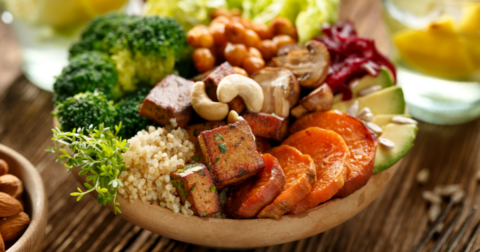News
Sales of Antibiotics for Farm Animals Jumped 16%, FDA Data Shows
Health•4 min read
Explainer
How one switch addresses both personal and environmental health.


Words by Seth Millstein
The new year is just around the corner, and for many people, that means it’s resolution time. Regardless of whether you want to make the world a better place, save some money or simply get healthier in 2024, adopting a plant-based diet is a great New Year’s resolution, as it has the power to accomplish all three in one fell swoop. Let’s take a look at a few of the many reasons why.
First, it’s important to define what a plant-based diet is. “A healthy, plant-based diet aims to maximize consumption of nutrient-dense plant foods while minimizing processed foods, oils, and animal foods (including dairy products and eggs),” according to the National Institute of Health. “It encourages lots of vegetables (cooked or raw), fruits, beans, peas, lentils, soybeans, seeds, and nuts (in smaller amounts) and is generally low fat.”
Plant-based diets have skyrocketed in popularity over the last several years. The number of Americans identifying as vegan, for instance, increased by 600 percent between 2014 and 2017, though the numbers hit a flatline after 2020. A 2021 survey found that 88 percent of food businesses around the world expect demand for plant-based products to surge in the coming years, and that’s no surprise, given the many benefits of a plant-based diet. Here are some of them.
Producing food on an industrialized scale always takes its toll on the environment, regardless of what kind of food is being produced. But the production of animal products, and meat in particular, takes a bigger toll than anything else.
A 2021 study found that meat production is responsible for 35 percent of all greenhouse emissions caused by human activity. Additionally, 57 percent of all greenhouse emissions caused by food production come from meat, which is almost twice the amount of emissions caused by the cultivation of plant-based foods.
“To produce more meat you need to feed the animals more, which then generates more emissions,” Xiaoming Xu, a University of Illinois researcher and lead author of the study, told the Guardian. “You need more biomass to feed animals in order to get the same amount of calories. It isn’t very efficient.”
Meat and dairy production also account for the majority of food-related land use, a 2022 study found: around 83 percent of farmland is used to produce animal products, yet those products only account for 18 percent of the calories and 37 percent of the protein we consume. If everyone switched to a plant-based diet, it could reduce global greenhouse emissions by 49 percent, and food-related land use by 76 percent, according to that same study.
Adopting a plant-based diet is also a great way of conserving water. Food production almost always requires water at some point in the process, because plants and animals both need H20 to survive. But meat requires much, much more water, according to a study by the UK’s Institute of Mechanical Engineers. For instance, it takes 9.5 times as much water to produce a single pound of beef as it does to produce a single pound of bread.
“A vegan diet is probably the single biggest way to reduce your impact on planet Earth, not just greenhouse gasses, but global acidification, eutrophication, land use and water use,” Joseph Poore, who in 2018 co-authored the most comprehensive study to date of farming’s impact on the planet, told the Guardian. “It is far bigger than cutting down on your flights or buying an electric car.”
If nothing else, the potential health benefits of a plant-based diet makes it a worthwhile switch to consider. A 2006 review of 87 existing studies, for instance, concluded a plant-based diet leads to lower rates of heart disease, obesity, diabetes and high blood pressure.
On factory farms, animals can be subject to unfathomable suffering, often from the moment after they’re born until the moment they die. While there are some companies and farms that produce animal products on a smaller and less inhumane scale, such companies are a very, very small minority.
Some people dismiss the gravity of this under the mistaken belief that the animals in question “can’t feel pain,” or “aren’t sentient.” But this simply isn’t true; study after study has found that the animals we eat do feel pain, and are sentient.
Concerns about the ways animals are treated on factory farms are a big reason why so many people are transitioning to plant-based diets. If you’re eating more plants, you’re eating fewer animals, and that means fewer animals are suffering.
Bacterial infections are rampant on factory farms, thanks to the cramped and unsanitary conditions in which animals are forced to live. Take cows, for example: in order to stave off infections, farmers give cows antibiotics, and they give them a lot of them; over 70 percent of all antibiotics sold in the United States are used on cattle.
There are two problems with this. The first is that when antibiotics are used excessively, the bacteria starts becoming resistant to antibiotics. The second problem is that many bacteria travel very easily from animals to humans, and some of those bacteria — like salmonella — can kill you. What this means is that the meat and dairy industry has inadvertently created antibiotic-resistant strains of deadly bacteria, and if you eat meat or drink milk from an animal that has contracted said bacteria, you may contract it, too.
This may sound like fear-mongering, but it isn’t. Antibiotic-resistant bacteria killed over 1.2 million people in 2019, and contributed to an additional 4.9 million deaths. That’s a higher death toll than HIV/AIDS or malaria, and makes antibiotic-resistant bacteria a leading cause of death worldwide.
Switching to a plant-based diet helps mitigate this risk on both a macroeconomic level and individual level. Buying and consuming fewer animal products reduces the demand for those products, which means fewer animals being farmed and thus fewer being given antibiotics. And on the individual level, eating more plants and fewer animals is associated with much better health outcomes overall.
If you’re trying to cut back on spending, switching to a plant-based diet is a great way to do it. In high-income countries such as the U.S., veganism is the most affordable diet and can reduce food expenses by up to 30 percent, a wide-reaching study by Oxford researchers found in 2021. Vegetarianism is the second-most affordable diet, followed by flexitarianism, which can cut food expenses by 14 percent. One study found that vegans and vegetarians spend an average of $23 less at the grocery store per visit than their carnivorous counterparts.
If all of this sounds counterintuitive, it’s probably because plant-based alternatives to specific meat products — for instance, plant-based burgers — can be more expensive than the products they seek to recreate. But Impossible Burgers, delicious though they may be, aren’t the only way to eat more plants. There are plenty of plant-based diets that are not only inexpensive, but actually less expensive than the traditional alternative.
It’s worth noting that not all plant-based diets are created equal. For instance, eating nothing but potatoes and licorice would technically be a “plant-based” diet, but it obviously wouldn’t be a very nutritious one. If you’re thinking of going plant-based in 2024, it’s worth doing a bit of research beforehand to make sure your diet is a nutritious one. Looking at the Veganuary website, which helps people try a vegan diet for the month of January, can be a good place to start.